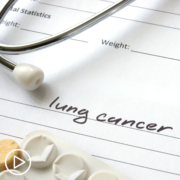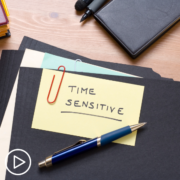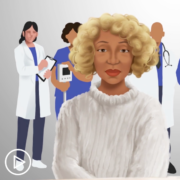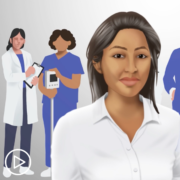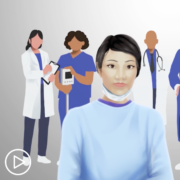Advances in Small Cell Lung Cancer Research | Hope for the Future
Advances in Small Cell Lung Cancer Research | Hope for the Future from Patient Empowerment Network on Vimeo.
What new treatments are being studied for small cell lung cancer (SCLC)? Dr. Triparna Sen, a leading researcher in the field, shares promising updates, including advances being made with LSD1 inhibitors, DDR (DNA Damage Response) inhibitors, and DLL-3 targeted therapies.
Dr. Triparna Sen is an associate professor in the department of oncological sciences and co-director of the Lung Cancer PDX Platform at the Icahn School of Medicine at Mount Sinai in New York. Learn more about Dr. Sen.
See More from Thrive Small Cell Lung Cancer
Related Resources:

|

|

|
Transcript:
Katherine:
Dr. Sen, you are a leading researcher in the field. What is the latest research news that you can share with us about small cell lung cancer?
Dr. Sen:
There’s a lot of great research going on in my lab and labs all across the world. I think for the first time in a very long time, we are really trying to dissect the biology of small cell.
It has been a research in making for many years. I think we have now really come to a point where we are really trying to understand the disease. I’ll go into a little more about the questions you are trying to answer. So, one of the main questions or one of the main things that kind of is a hurdle to getting durable treatment options is that the frontline chemotherapy and immunotherapy doesn’t work as well as they should even for the approved regimens, which is the chemotherapy and the immunotherapy.
The patients often do not have durable benefits. Even if patients have durable benefits, it’s only in a very minority of patient population which means in only about 10 to 15 percent of the total patient population actually do have any benefit from the frontline treatment. So, the main question that we are trying to answer is that why do these patients not respond to immunotherapy and chemotherapy in the frontline.
What are the mechanisms of resistance to chemotherapy and immunotherapy? Primary resistance, what I mean by primary resistance is that patients who never respond. The disease comes back even while they’re getting the frontline chemo. So, the primary resistance, the mechanisms. Of course, when they have acquired resistance after the maintenance regimen when they come back, why are these patients having this acquired resistance to chemotherapy and immunotherapy? Because only when we understand resistance mechanisms will we be able to then come to the combination strategies.
That’s the next area of research is that once we understand the mechanism of chemotherapy and immunotherapy resistance is then coming up with effective combination therapy. So, what should we combine with immunotherapy in order to make immunotherapy better? I’ll give you an example from the research that we did.
So, our lab focus is, as I said, on making immunotherapy better. What we understood is that there are certain epigenetic modifiers like LSD1.
Repressing these, repressing LSD1, with a small molecule inhibitor actually augments or benefits the response to immunotherapy. So now, we are looking at LSD1 inhibitors in combination with immunotherapy. That’s one area that we are focusing on. The second are that we published extensively on is DNA damage response inhibitors which really works in combination with immunotherapy and makes immunotherapy response better.
Now, we are investigating that in the lab the combination strategies of combining these DNA damage response inhibitors with immunotherapy. So, combination strategies. I think always coming up with novel targets. I will mention there are many novel targets that are right now in the clinical trials actually showing really, really encouraging data.
I’m talking about DLL3 targeted BiTEs or ADCs we have seen that are showing preliminary data. We have seen a really good really good response in patients. So, finding these targets that are very specific for small cell and that can work in these unique population of patients.
So, DLL3 targeted agents. There are agents that target B7-H3. So, we are looking at these novel targets and where they could fit in the current therapeutic regimen. Finally, since small cell lung cancer is not a surgical disease, we have to look for other options to find biomarkers. So, liquid biopsy. Liquid biopsy, what I mean by that is understanding the disease not just from tissue but also from blood.
There’s a lot of research that’s happening in understanding the biology of small cell from blood draws from these patients.
So, the field of using liquid biopsy or understanding the disease from blood draws is one of the areas that many labs, including ours, are focusing on, and how we can utilize these blood samples to then monitor the disease and also understand the resistance mechanisms to various drugs. I think these are the areas that we are investigating and seems, to me, very important areas that we need to address in order to really manage small cell lung cancer.
Katherine:
What do these advances mean for small cell lung cancer patients? Are you hopeful?
Dr. Sen:
Oh, yes. Of course. We’re always hopeful. That’s the goal, right. The goal is to have effective therapies that work and that works for a long time. That also benefits the patients in terms of quality of life which means without very severe adverse effects.
So, very hopeful. Because I think what was limiting us for all those years for the last 40 to 50 years is that we really did not understand the complexity of small cell lung cancer. It is a very complex disease. It is very different from non-small cell lung cancer which has these mutations that you can target drugs against. So, there are this EGFR mutations and KRAS mutations in non-small cell.
But small cell, it’s not that. It is not a disease where we have these GATA function mutations that we can devise therapies against. It’s a very different disease. The disease is aggressive. The disease progresses fast, and it also changes its physiology very fast. So, I think for the first time, we really are trying to understand the biology. What that helps is then to come with very informed decisions about therapy.
So, yeah, I’m very hopeful. Because I think we have now targets that we are actually seeing benefits in patients. I think the more and more we understand resistance mechanisms, we’ll also be able to manage that better.
Katherine:
That’s very promising news.

